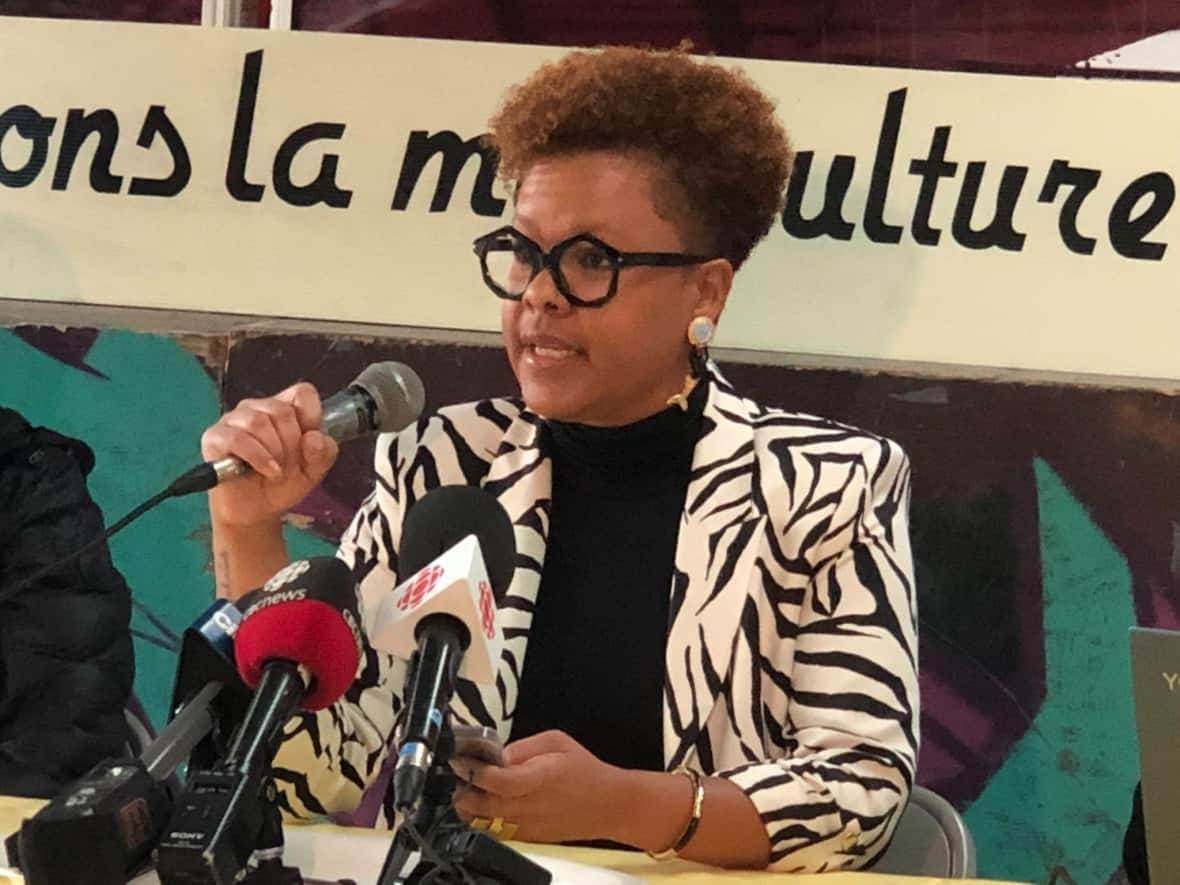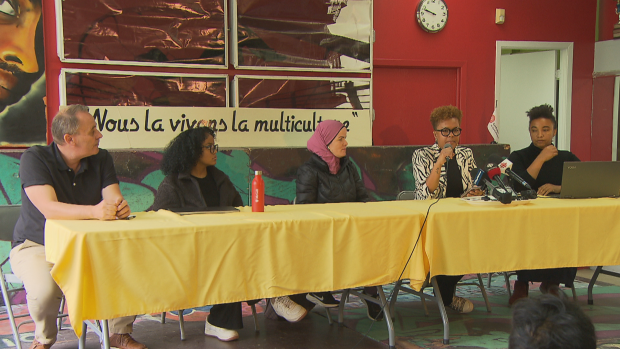Montréal-Nord community groups speak out against police in schools program

Parents and community organizers in Montréal-Nord say they were not consulted about a plan to curb gun violence by sending police officers into schools — and if they had been, they would have made it clear they were against it.
"Montréal-Nord is a borough that is already stigmatized enough, it's not necessary to stigmatize high schools any further," said Slim Hammami, a co-ordinator at the youth group Café-Jeunesse Multiculturel.
"Of course, we were not consulted or informed of this project — which is understandable because, had we been consulted, we would have been against this," said Hammami.
At a news conference they held Thursday morning, organizations like Head and Hands, Solidarity Without Borders and École Sans Police said the selected schools are in predominantly Black and racialized neighbourhoods.
"Families are scared and worried," said Hammami. "Families will feel the consequences of the spirit of this project."
When the city announced the project, it emphasized that the new police team would work alongside community organizations. But Hammami worries these groups will be treated as the last line of defence.
The project — a division with the Service de Police de la Ville de Montréal (SPVM), called Équipe-école (the school team) — involves 10 members, including three specialized police officers, psychosocial workers, criminologists and a specialist in cybercrime.
The team will be deployed to select schools to try to curb gun violence through in-person and online prevention programs and intervention.
A spokesperson for the city said this new team will go into schools on a request basis, if school officials notice a problem with one or more of their students.
Worries about increased surveillance of children
Marlihan Lopez, an organizer with École Sans Police (school without police), is the mother of a child on the autism spectrum and says she has faced barrier after barrier trying to get resources for him.
She pointed to research showing that Black kids typically experience racial profiling for the first time in school — often by school personnel.
Instead of more funding for a police project, Lopez would like to see better pay for teachers as well as more psychologists, counsellors, cultural pedagogy and anti-racism training in schools.

"I've been confronted by a lack of specialized services that tackle the academic barriers a lot of these youth and children face."
Lopez points out that officers called to schools often come from outside the communities they police and can bring biases along with them.
"Bringing in police in that type of context is going to put [kids] in an even more vulnerable position in terms of racial profiling, surveillance and policing. That's something that concerns me as a parent and community organizer," said Lopez.
Lack of trust in police, school personnel
Emmanuel Tabi, a professor of integrated studies in education at McGill University, said he recently asked his graduate class how many students had colleagues his Black sons would not be safe with. Every single student, who all work as teachers, raised their hand, he said.
"If the program is not speaking to and about and centring the social and emotional well-being of Black children and youth, how can we expect it to help? That needs to be the beginning, the end and the centre of it," said Tabi.

The city says Équipe-école was put in place following the Montreal forum on fighting gun violence to support schools and their violence-prevention strategies. But Tabi says there is a difference between intent and impact.
He agrees there is a need for support in the face of gun violence, but Tabi doesn't think being around police with the mindset to "reform" kids will make youth feel safe.
He said teachers have sometimes called the police on their young students before contacting their parents, which can be an emotional blow to a child.
Officers can confuse mistrust from kids with the validity of their biases, Lopez said.
Tabi says investing in programs that offer students opportunity is probably a better use of public money.
"What I've found is [kids] go to after-school programs that support their emotional lives and well-being. If school is not doing that, I don't think this program is going to do that."
The SPVM says Équipe-école's goal is to "influence the path of young people in the process of being marginalized by offering them wise solutions" to reduce the number of crimes involving weapons in the long term and that "civilian resources will be the majority within this multidisciplinary unit."
For more stories about the experiences of Black Canadians — from anti-Black racism to success stories within the Black community — check out Being Black in Canada, a CBC project Black Canadians can be proud of. You can read more stories here.



